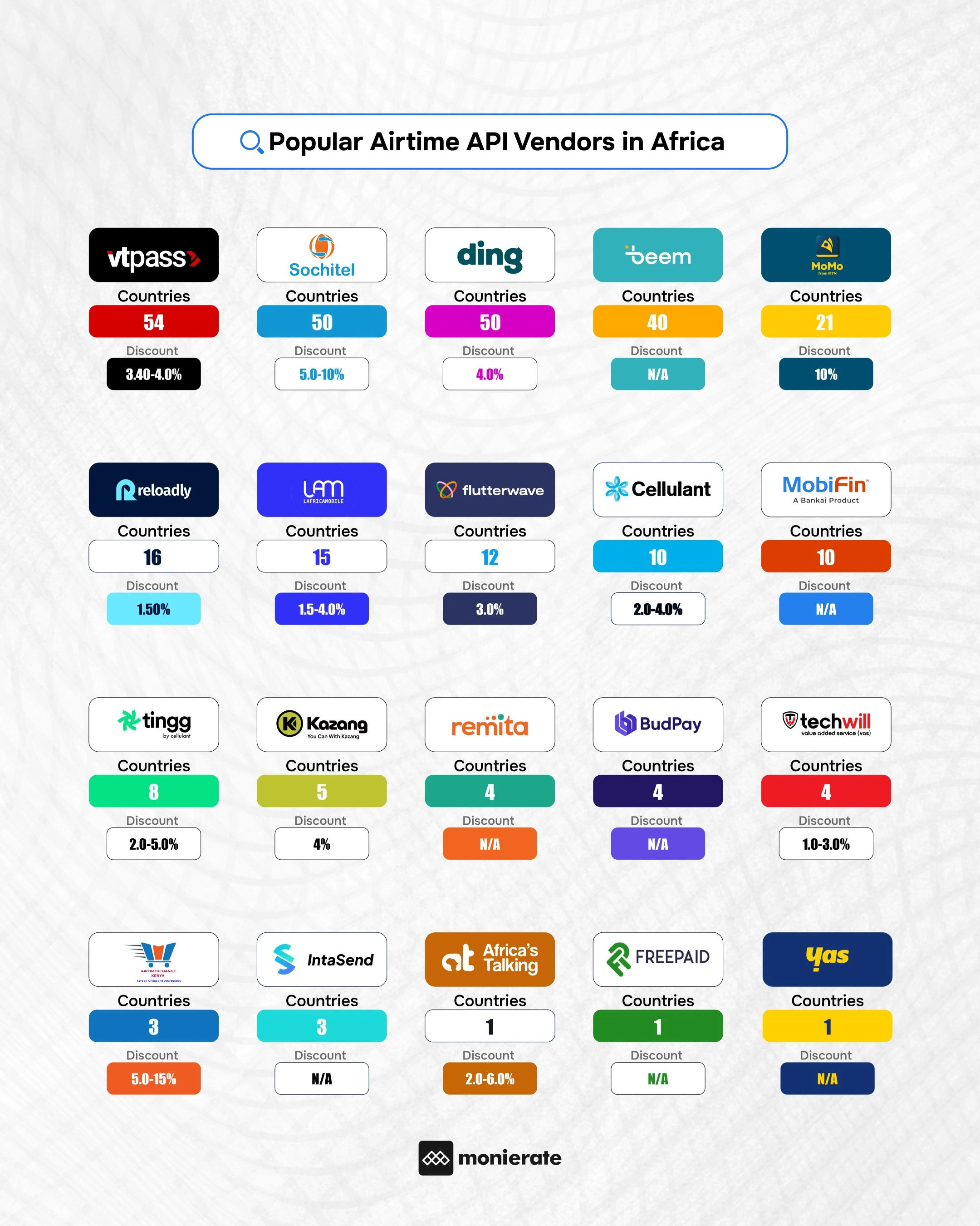
Africa’s fintech sector is thriving, with mobile money transactions reaching $912 billion in 2024, driven by a 98% prepaid mobile market and 614 million unique mobile subscribers in Sub-Saharan Africa alone.
Airtime APIs are pivotal, enabling seamless top-ups, micropayments, and financial inclusion across 54 African countries. With over 50 airtime vendors, 70% of whom offer integrated APIs, these platforms empower businesses to distribute airtime programmatically, transforming digital payments. Nigeria leads with 17+ vendors, and the country remains Africa’s Fintech powerhouse.
This report ranks top vendors like Reloadly, DingConnect, and Africa’s Talking based on discounts (up to 6%), network coverage (600+ networks), and geographic reach by analyzing their impact on scalability, revenue, and inclusion, highlights how airtime APIs are reshaping Africa’s digital economy, addressing challenges like fraud and regulatory complexity.
Key findings
- Nigeria Dominates Airtime API Market: With 17+ vendors, Nigeria leads Africa’s fintech ecosystem, powering airtime distribution and digital payments. Its robust infrastructure supports rapid fintech growth.
- Reloadly and DingConnect Offer Unmatched Network Coverage: Supporting 600+ and 550+ networks across 50+ countries, these vendors excel in multi-country operations, ideal for pan-African strategies.
- Africa’s Talking Leads in Discounts: Offering 2-6% discounts on bulk airtime, it’s a top choice for cost-conscious businesses, boosting scalability.
- Fraud and Regulation Pose Challenges: Inconsistent regulations and fraud risks, like unauthorised top-ups, threaten trust. Robust security and compliance are critical for growth.
- Mobile Money Drives Financial Inclusion: Telecom giants like MTN MoMo and Safaricom M-Pesa integrate airtime with mobile money, expanding access in underserved regions.
Get Access
The raw research data is available for download here.
Ranked List of Top Airtime API Vendors in Africa
This Data is sourced from company reports, industry analyses, and proprietary research as of Q1/Q2 2025.
| Provider | Discounted Rates | Network Coverage | Geographic Reach | Key Metric |
|---|---|---|---|---|
| Reloadly | 1.5% for high-volume | 600+ networks (MTN, Airtel, Vodacom, Orange, Glo) | 54 African countries (Nigeria, Kenya, Ghana, South Africa, Ethiopia) | Near-universal coverage for multi-country operations |
| DingConnect | Fixed 4% off retail rates | 550+ networks (MTN, Vodacom, Airtel, Ethio Telecom) | 52 African countries (Nigeria, Ethiopia, Kenya, Algeria, Morocco) | Matches Reloadly in reach; excels in diaspora top-ups |
| Africa’s Talking | 2–6% (volume-based) | 200+ networks (MTN, Safaricom, Airtel, Orange) | 30 countries (Kenya, Nigeria, Ghana, Uganda, Ethiopia) | Highest discounts for bulk purchases |
| Flutterwave | 3% for bulk purchases | Major networks (MTN, Airtel, Glo) across 34 countries | 34 countries (Nigeria, Ghana, Kenya, Uganda, South Africa) | Strong regional presence with payment integration |
| Hablax | 4% for bulk purchases | 14+ networks in select markets | Limited (Nigeria, Kenya, Ghana) | Competitive discounts, limited scalability |
The rankings reflect the diversity of Africa’s airtime API market. Reloadly and DingConnect lead with near-continental coverage, supporting 600+ and 550+ networks, respectively, making them ideal for pan-African businesses.
Africa’s Talking stands out for cost savings with up to 6% discounts, appealing to developers in tech hubs like Nairobi and Lagos.
Flutterwave’s payment integration strengthens its regional dominance, while Hablax offers niche reliability. These vendors drive financial inclusion by enabling seamless airtime access, but challenges like fraud and regulatory hurdles require robust solutions.
The data underscores Africa’s fintech potential with Nigeria and Kenya as key hubs.
Researcher’s Take
Africa’s fintech story is one of leapfrogging and airtime APIs are a quiet force behind that leap.
In 2024, mobile money transactions on the continent hit an impressive $912 billion, driven by a 98% prepaid mobile market and more than 614 million users.
In this mobile-first ecosystem, airtime isn’t just about making calls; it’s fast becoming a form of currency.
Airtime APIs also let businesses plug airtime directly into their apps to power micropayments, reward loyal users, or keep customers engaged without needing full banking rails.
This flexibility is especially valuable in regions where traditional infrastructure is limited, but mobile access is high.
Still, the path forward isn’t without bumps. Fraud remains a serious concern, with cases of unauthorised top-ups and backend exploits.
Regulations are also patchy across Africa, making it hard for innovators to build across borders with confidence.
What’s needed? Smarter security and clearer, more unified policies.
Those watching the market (Investors) should keep an eye on established players like DingConnect, known for scale and infrastructure, while Startups can go lean with platforms like Africa’s Talking, which lowers the barriers to entry with developer-friendly pricing and tools.
With a projected $65 billion market, airtime APIs aren’t just a technical feature; they’re a solid support of Africa’s digital economy. Understood well and used right, they could help millions access financial tools in ways that feel simple, seamless, and native to how people already live and connect.
This report draws on data collected as of Q2 2025 from company reports, industry analyses, CB Insights, Statista, and proprietary surveys of airtime API vendors.
Analysis of metrics like discounted rates, network coverage, and geographic reach, cross-referencing with public filings and vendor websites was made.
Limitations include incomplete data for private companies like Hablax and variations in discount reporting due to volume-based pricing.
The research focused on Africa’s top fintech markets- Nigeria, Kenya, Ghana and South Africa, and verified data through multiple sources to ensure accuracy.
The methodology adopted prioritizes transparency and reliability, providing a clear snapshot of the airtime API landscape while acknowledging potential gaps in real-time transaction data.
